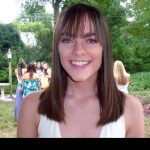Not long gone, and definitely not forgotten, Nick Allen completed his Master’s degree in UNC’s English Department’s Literature, Medicine, and Culture program in 2019 and thus concluded his role as HHIVE Lab Coordinator. Nick discovered HHIVE through his undergraduate thesis advisor who recommended he speak to Jane Thrailkill, the lab’s director. After looking further into the organization, Nick decided he wanted his graduate work to include investigation into the health humanities.
During his tenure as lab coordinator, Nick managed undergraduate volunteers, organized Grand Rounds series speakers, and was in charge of the HHIVE website. His biggest challenge was encouraging undergraduate engagement as Professor Thrailkill conducted research away from the lab. In order to do so, he routinely connected students conducting research with professors, specialists, and other researchers. In doing so, Nick was able to share what he views as the greatest asset of working in HHIVE: using an established network to expand his own knowledge while creating interconnectivity between disciplines.
Through what he calls a space of interconnectivity with a “health community mindset,” Nick flourished in his research while creating his capstone and doing work for the Southern Oral History Program. A direct tie-in to health humanities, Nick created a virtual listening room as a space for stories about death and dying to be told. The theory behind this innovative art form was that with more exposure to the topics of aging and death, people would become comfortable discussing end-of-life scenarios. Through his research, Nick discovered that discussing death and becoming comfortable with it is the number one way to improve end-of-life outcomes.
His personal interest in this subject and research during his capstone led him to the Southern Oral History Program. This UNC program has collected over 6,000 stories through interviews with Southerners in order to preserve the history and experiences of the people and the place. It was here that Nick began collecting testimonials and interviews from older participants for “Stories to Save Lives.” Without initially realizing it, Nick was participating in narrative medicine, providing people with an opportunity to talk about death and medical care in a comfortable setting. The interviews primarily focused on the emotional and social implications of getting older, a topic that adults are rarely approached with and often avoid discussing.
As his research progressed, Nick realized that “older adults are probably more willing, and maybe even desire to talk about death and dying, more than we give them credit for.” As people candidly opened up to him, he was able to have very frank, productive conversations with them that gave patients an avenue of expression that previously did not exist. As a culmination of this project, along with the virtual listening room, Nick independently published his work as a book called Voices: An Oral History at Galloway Ridge. His efforts allowed these stories to be “no longer just contained within the walls of a retirement community but opened up to an intergenerational audience.” Nick approached these conversations boldly and was rewarded by the honest testimonials given.
Today, Nick works at UNC’s World View, continuing to engage his interdisciplinary sensibilities and networks. He is currently in the process of transforming his research into a children’s book in order to broaden its already intergenerational audience. Nick believes that our culture does not credit children’s capability to understand the concept of death and does them a disservice by instead avoiding the topic entirely. He hopes to ethically and sensitively introduce the concept to a novel audience, allowing parents to have these conversations early with their children.
Throughout it all, Nick discovered that the way to open doors and find new opportunities is to be bold in using connections and that most people are willing and excited to help young, curious researchers pursue their goals. He emphasizes that anyone who hopes to bridge the gap between health and the humanities should make connections any way they can and explore the academic environment to its fullest. HHIVE, he says, is an invaluable asset to anyone looking to have thoughtful interactions about health humanities and get access to a broader network of driven and talented individuals. Furthermore, Nick views health humanities as a means of human connection that allows us to understand and explore other’s perspectives. The narrative of the patient is important for doctors, teachers, and students to understand, and makes a more empathetic and sincere society. As a field that is viewed in a different way by almost everyone in it, health humanities functions as a great avenue for bringing people closer together.
Although Nick has concluded his tenure as HHIVE Lab coordinator, he remains connected to the individuals in the lab and emphasizes that he remains a resource to those pursuing similar interests. He uses skills from studying health humanities in his current projects and says the heightened ability to network gained from the lab has proven useful in his research efforts—health humanities or otherwise. He is a part of HHIVE’s ever-expanding network and is an alumnus that the program is proud to see flourish in the literary world.
 Kate Capitano is a senior majoring in Global Studies. Her concentration is Public Health and Environment with Latin America as the area of study. She is also on the pre-med track and hopes to combine the two through the Medicine, Literature, and Culture Minor. Specifically interested in women’s rights and health, Kate hopes of one day becoming an OBGYN.
Kate Capitano is a senior majoring in Global Studies. Her concentration is Public Health and Environment with Latin America as the area of study. She is also on the pre-med track and hopes to combine the two through the Medicine, Literature, and Culture Minor. Specifically interested in women’s rights and health, Kate hopes of one day becoming an OBGYN.


